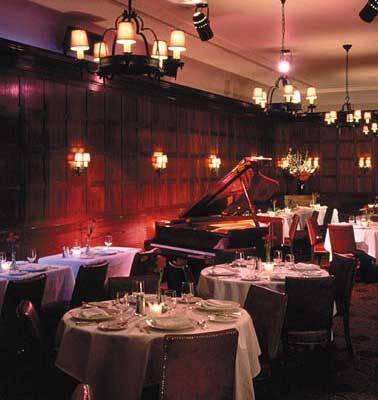Terry Teachout's Blog, page 182
February 2, 2012
TT: Closing time
* * *
Eighty well-dressed people sit silently in a darkened, oak-paneled room in the center of Manhattan. Some have plates of food in front of them, others have drinks at their elbows, but nobody is paying much attention to food or drink right now, not even the waiters. Instead, they're all listening to a woman seated on a high stool placed in the bend of a piano, her handsome face lit by a single baby spotlight. Her name is Weslia Whitfield, and she's singing a song everyone here knows by heart: Somewhere over the rainbow/Bluebirds fly/Birds fly over the rainbow/Why then oh why can't I? It takes a lot of nerve, and a lot of talent, to sing a song like that in a room like this. The woman has both, which is why the crowd is so quiet: you could hear a pin drop across the street.
 The song ends, and the crowd cheers--decorously (for this is a decorous room), but nonetheless enthusiastically. As the applause swells and the waiters start stalking through the room once more, Weslia Whitfield grins her crinkly-eyed, I'm-having-fun grin and nods her head in acknowledgment of the hubbub. She knows what she just did: she stopped the show in the Oak Room of New York's Algonquin Hotel. For a cabaret singer, life doesn't get much better than this.
The song ends, and the crowd cheers--decorously (for this is a decorous room), but nonetheless enthusiastically. As the applause swells and the waiters start stalking through the room once more, Weslia Whitfield grins her crinkly-eyed, I'm-having-fun grin and nods her head in acknowledgment of the hubbub. She knows what she just did: she stopped the show in the Oak Room of New York's Algonquin Hotel. For a cabaret singer, life doesn't get much better than this.One of the first things I did after I moved to New York City was have dinner at the Algonquin with a group of friends, budding writers all. We sat at a round table in the Rose Room and gazed longingly across the room at another round table--the round table, to be exact. We didn't say anything about it, because we didn't have to; we'd all read the same books in high school and college, and dreamed the same dreams. Instead of pointing and gawking, we swapped wisecracks, pretending they were as clever as the ones George S. Kaufman and Dorothy Parker fired off right over there. I kept thinking of the scene in the movie Laura in which the beautiful Gene Tierney accosts the waspish Clifton Webb at lunchtime: it was filmed here. No doubt everyone else at our table, if not the whole room, was thinking roughly similar thoughts. The Algonquin does that to you....
The Algonquin Hotel is still doing business at the same old stand, 59 W. 44th St., just about halfway between Broadway and Grand Central Station. Needless to say, the Round Table is no longer in operation, and more than a few of its once-renowned members are long forgotten. (When did Franklin P. Adams' name last cross your mind?) But in a city that prides itself on change, the Algonquin prides itself on not changing, and if Noel Coward, Harpo Marx, or William Shawn were to stroll through the front door tomorrow morning, they'd know just where they were. The lobby still has the comfortable air of a slightly down-at-heel men's club--you ring a brass bell to summon a waiter--and Matilda, the current Algonquin cat, still has free run of the place. Fancy it isn't; classy it most decidedly is.
A very large part of what makes the Algonquin so classy is what goes on in the Oak Room at night. During the day, it's a well-lit place to eat lunch, complete with canned music; after dark, it's New York's most prestigious supper club, the place where every singer in America who prefers Cole Porter to MTV Unplugged dreams of working. Back in 1939, Frank Case, who ran the hotel throughout its Round Table days, turned the Oak Room into a nightclub whose regular patrons included the likes of Tallulah Bankhead, Greta Garbo, and Hedy Lamarr. But World War II put an end to cabaret at the Algonquin, and it wasn't until 1981 that the Oak Room again became a venue for American popular song. The singer-pianist Steve Ross, hired on a trial basis, stayed there for four years, and the Algonquin has been presenting cabaret acts ever since....
 What makes the Oak Room so special? Obviously, the singers who perform there are the heart of the matter, though the room itself contributes significantly to the effect they make. Cabaret is an intimate art, and the 80-seat Oak Room, with its amber sconces and red velvet banquettes, is as up close and personal as a love seat at midnight: there is no finer place to listen to songs of passion and despair. "It's nice singing in a room this small," Whitfield says, "because I get feedback from the people. I know what works--and what doesn't work. When they're bored, you can hear them scrunching up their toes in their shoes. You can get that kind of response in a larger room, but it's very slow, and very limited."
What makes the Oak Room so special? Obviously, the singers who perform there are the heart of the matter, though the room itself contributes significantly to the effect they make. Cabaret is an intimate art, and the 80-seat Oak Room, with its amber sconces and red velvet banquettes, is as up close and personal as a love seat at midnight: there is no finer place to listen to songs of passion and despair. "It's nice singing in a room this small," Whitfield says, "because I get feedback from the people. I know what works--and what doesn't work. When they're bored, you can hear them scrunching up their toes in their shoes. You can get that kind of response in a larger room, but it's very slow, and very limited."But the Oak Room's not-so-secret ingredient, irreproducible at any price, is the fact that it is part and parcel of the Algonquin Hotel. "Lots of famous people slept at the Waldorf," an old Algonquin hand says sniffishly, "but nobody did anything there." Well, plenty of people did things at the Algonquin, and not just the members of the Round Table, either. William Faulkner wrote his Nobel Prize acceptance speech there; the New Yorker was practically invented there. Sinclair Lewis actually offered to buy the place. Everybody who sings in the Oak Room knows it isn't just another club: it's a piece of history. "There are ghosts here," says Weslia Whitfield. "But good ghosts. They want you to do well."
It struck me the other day that America had finally realized Karl Marx's dream of a classless society: nobody here has any class. But in the Oak Room, all the men wear ties and--at least when the music is playing--all the women look like Gene Tierney, cool and chiselled and enigmatic, thinking their private thoughts as Weslia Whitfield lifts her silvery voice in song. Gangsta rap and grunge rock may rule the airwaves, but in this dark, quiet room, Harold Arlen still prospers. Alec Wilder, another great American songwriter (and longtime Algonquin resident), planned at one time to write a book about the Algonquin Hotel called The Elegant Refuge. Though the book never got written, the title was a perfect fit, and still is. For the middle-aged, the Oak Room is a blessed refuge from the squalor of the present; for the young, it is the classroom in which they learn the lost language of elegance. Long may it reign.
TT: Roll away the stone
Yesterday I finally broke through the ice and wrote the following words:
Hollywood has always had an equivocal relationship with jazz. Once upon a time, the presence of a saxophone on the soundtrack of a Hollywood film was a signpost pointing to unbridled sexuality. Nowadays it indicates world-weary sophistication. But no matter what signals the sound of jazz is meant to send, the making and makers of jazz have usually been romanticized when they are portrayed in movies (just as the music itself is softened). Nor has the American film industry ever been at ease in putting black musicians on the screen in anything other than the most stereotypical of roles--when it allows them to appear at all. The supremely photogenic Louis Armstrong was customarily relegated to such roles, so much so that he once played a character who was referred to on screen as "Uncle Tom." Even though the first feature-length talking picture was called The Jazz Singer, it was not until 1929 that black jazz musicians of importance appeared on the silver screen. Moreover, the films in question were shot in Manhattan, not Hollywood, and they were directed not by an old studio hand but by an avant-garde filmmaker.
And...I'm off!
* * *
Black and Tan, a 1929 short directed by Dudley Murphy and starring Duke Ellington and Fredi Washington:
TT: The Eames films (IV)
TT: So you want to see a show?
Here's my list of recommended Broadway, off-Broadway, and out-of-town shows, updated weekly. In all cases, I gave these shows favorable reviews (if sometimes qualifiedly so) in The Wall Street Journal when they opened. For more information, click on the title.
BROADWAY:
• Anything Goes (musical, G/PG-13, mildly adult subject matter that will be unintelligible to children, closes Sept. 9, most performances sold out last week, reviewed here)
• Godspell (musical, G, suitable for children, reviewed here)
• How to Succeed in Business Without Really Trying (musical, G/PG-13, perfectly fine for children whose parents aren't actively prudish, reviewed here)
• Other Desert Cities (drama, PG-13, adult subject matter, most performances sold out last week, reviewed here)
• Seminar (serious comedy, PG-13, closes Mar. 4, reviewed here)
• Stick Fly (serious comedy, PG-13, reviewed here)
OFF BROADWAY:
• The Agony and the Ecstasy of Steve Jobs (monologue, PG-13, closes Mar. 4, reviewed here)
• Avenue Q (musical, R, adult subject matter and one show-stopping scene of puppet-on-puppet sex, reviewed here)
• The Fantasticks (musical, G, suitable for children capable of enjoying a love story, reviewed here)
• Million Dollar Quartet (jukebox musical, G, off-Broadway remounting of Broadway production, original run reviewed here)
CLOSING NEXT WEEK IN SAN DIEGO:
• Dividing the Estate (drama, PG-13, remounting of Broadway production, adult subject matter, closes Feb. 12, reviewed here)
CLOSING NEXT WEEK IN SANTA MONICA:
• Our Town (drama, G, remounting of off-Broadway production, suitable for mature children, closes Feb. 12, original run reviewed here)
CLOSING SUNDAY IN CORAL GABLES, FLA.:
• The Motherf**ker with the Hat (serious comedy, R, adult subject matter, reviewed here)
TT: Almanac
William Shakespeare, Richard II
February 1, 2012
TT: Man at work (sort of)

You will note that I'm taking pictures of it rather than sitting at it.
THE PRODUCER
TT: In the beginning
 This story appeared in the New Orleans Times-Democrat on January 2, 1913. It was
reproduced
in the Times-Picayune the other day. Here's how I described it in
Pops: A Life of Louis Armstrong
:
This story appeared in the New Orleans Times-Democrat on January 2, 1913. It was
reproduced
in the Times-Picayune the other day. Here's how I described it in
Pops: A Life of Louis Armstrong
:The law of unintended consequences was working overtime when Louis pried open his mother's cedar chest, stole a revolver belonging to one of his "stepfathers," loaded it with blanks, and took it along with him on his nightly tour of the red-light district. It was the last day of 1912, and the city was in its customary New Year's Eve hubbub. As Louis and his quartet strolled up Rampart Street, another boy from the neighborhood started "shooting" at them with a cap pistol. Louis promptly pulled his .38 out of his belt and fired back. All at once a policeman came up behind him and wrapped his arms around the boy. "Oh Mister, let me alone!" he cried. "Don't take the pistol! I won't do it no more!" He spent the night in a cell and went before a juvenile-court judge the next morning. What followed, unlike his birth eleven years before, was deemed worthy of coverage by the local papers: "Very few arrests of minors were made Tuesday, and the bookings in the Juvenile Court are not more than the average....The most serious case was that of Louis Armstrong, a twelve-year-old negro, who discharged a revolver at Rampart and Perdido Streets. Being an old offender he was sent to the negro Waif's Home." The old offender was hauled away in a horse-drawn wagon, scared and unsure. All unknowing, he had come to the turning point of his life.
The clip marks the very first time that Louis Armstrong's name appeared in print anywhere. Alas, all I had in hand was a fuzzy photocopy that was too dim to reproduce in Pops. How I wish that I could have included it in my book! Rarely has so great a man made so inauspicious a debut.
TT: The Eames films (III)
TT: Snapshot
(This is the latest in a series of arts-related videos that appear in this space each Monday and Wednesday.)
Terry Teachout's Blog
- Terry Teachout's profile
- 45 followers



